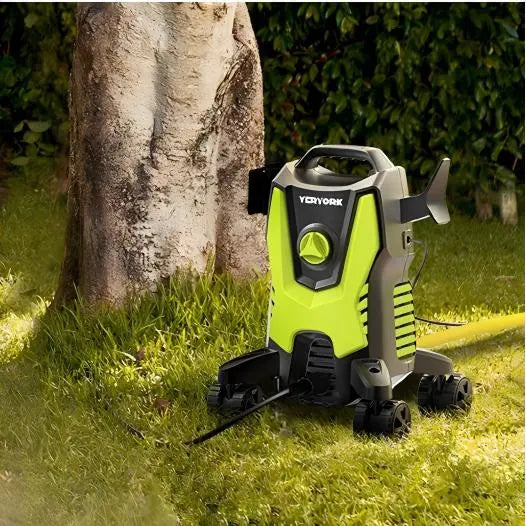Is an Electric Pressure Washer Worth Buying? — A Comprehensive Guide for Homeowners
Looking to upgrade your cleaning game? This guide breaks down whether an electric pressure washer is worth the investment. From cost savings to performance comparisons with gas models, discover how the right PSI level can handle everything from car washes to heavy-duty driveway cleaning.

Hey homeowners! Tired of weak hose water that can’t cut through grease or reach the corners of your patio? Does washing your car or blasting grime off the driveway leave you sore and frustrated? It might be time to consider your smartest backyard upgrade yet — a pressure washer.
But which one should you choose? Electric or gas-powered? 3000 PSI or 5000 PSI? Don’t worry — we’re breaking it all down in this no-nonsense guide.
Instead of diving into complicated specs, we’ll focus on three key questions:
Will it save money? Will it save effort? Is it right for your needs?
Electric vs. Gas — Why Most American Homes Should Go Electric
In recent years, electric pressure washers have surged in popularity among U.S. homeowners — and for good reason. They win in three major ways: they save money, time, and headaches.
1. Save More Money Over Time
- Lower upfront cost — A 2000–3500 PSI electric pressure washer typically runs between $100–$300, while comparable gas models often start at $300+.
- Lower energy costs — Let’s say you wash your car every other week and rinse the patio twice a month. An electric unit costs about $40–$50 per year in electricity, while gas units may burn through $150+ in fuel — even more when gas prices spike.
- Minimal maintenance — Electric models don’t require oil changes, spark plugs, or air filters. That’s an extra $100 or more in annual savings compared to gas washers.
2. Plug In and Go — Hassle-Free Operation
-
Push-button start — No more yanking a starter cord, especially after a chilly night.
- Lightweight and mobile — Most electric units weigh under 30 lbs and include wheels. Many models are easy enough for one-handed maneuvering — even for seniors or smaller users. (Gas models often weigh 40–60 lbs.)
- No gas, no mess — No need to store fuel or worry about leaks and fumes. Just grab it from your garage and go.
3. Quiet, Clean, and Community-Friendly
- Low noise levels — At 65–75 dB, they’re about as loud as a normal conversation. Use them in the morning or evening without worrying about HOA complaints. (Gas washers often hit 85+ dB, similar to a lawn mower, and may be restricted in some neighborhoods.)
- Zero emissions and no smell — Use safely in garages, on covered balconies, or around kids and pets. Perfect for townhouses and apartments with shared outdoor spaces.
What Can an Electric Pressure Washer Handle?
Not all pressure washers are built the same — the right PSI makes all the difference. Get one too weak and it won’t clean anything. Too strong and you risk damaging surfaces.
2000–3500 PSI: The Sweet Spot for Most Homes
Handles 90% of everyday cleaning tasks — safely and effectively.
- Car washing — 2300 PSI + 25° fan nozzle removes dirt, bird droppings, and grime without scratching your paint.
- Patios & driveways — 2800 PSI + turbo nozzle blasts away moss in the cracks and baked-on grease from grill stations.
- Fence and siding — 3000 PSI handles mold, algae, and mildew — great for avoiding HOA violations.
- Rental properties — Clean exterior walls on 20+ townhomes with just one machine — cutting per-cleaning cost by 40%.
- Farm gear — Wash livestock pens or tractor exteriors using 30% less water.
Recommended model:
• Yeryork 3500PSI Electric Pressure Washer
4000–5000 PSI: Built for the Toughest Jobs
These are heavy-duty machines — not for beginners.
- Concrete resurfacing — Remove top layers to prep for new coatings.
- Industrial messes — Cut through years of embedded oil stains and rust in auto shops. (4500 PSI + 0° nozzle required.)
- Paint stripping — Remove weathered paint that’s 5+ years old. (Fresh paint won’t budge.)
Recommended model:
• Yeryork 3500-5000PSI Adjustable Electric Pressure Washer
⚠️ Safety warning: These machines are powerful! Always wear protective clothing and goggles. Keep a 10-foot distance from surfaces and people.
Power & Payoff — Is It Worth It?
|
Comparison |
Electric Pressure Washer |
Gas Pressure Washer |
|
Price |
$100–$350 |
Starts at $300+ |
|
Operating Cost |
<$50/year (electricity) |
$150+/year (fuel) |
|
Maintenance |
Minimal — just rinse with clean water |
Oil changes, spark plug replacement |
|
Noise Level |
65–75 dB (anytime use) |
85+ dB (time-restricted in some states) |
|
Portability |
20–30 lbs, easy to wheel around |
40–60 lbs, heavier to lift |
|
Best For |
Homes, garages, restaurants, patios |
Construction sites, large farms |
- If you’re cleaning cars, patios, siding, or driveways, a 3500 PSI electric pressure washer is safe, powerful, and pays for itself within a year.
- Need to tackle old paint, deep oil stains, or rugged concrete? Step up to 3500–5000 PSI for professional-grade results.
Final Thoughts
An electric pressure washer isn’t just a nice-to-have — it’s a practical tool that helps you tackle outdoor cleaning tasks more efficiently. Whether you're rinsing off the driveway or giving your deck a refresh, the steady power makes the job easier and more satisfying.
